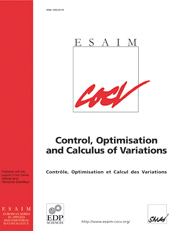No CrossRef data available.
Article contents
Well-posedness for Systems Representing Electromagnetic/Acoustic Wavefront Interaction
Published online by Cambridge University Press: 15 August 2002
Abstract
In this paper we consider dispersive electromagnetic systems in dielectric materials in the presence of acoustic wavefronts. A theory for existence, uniqueness, and continuous dependence on data is presented for a general class of systems which include acoustic pressure-dependent Debye polarization models for dielectric materials.
Information
- Type
- Research Article
- Information
- ESAIM: Control, Optimisation and Calculus of Variations , Volume 8: A tribute to JL Lions , 2002 , pp. 105 - 125
- Copyright
- © EDP Sciences, SMAI, 2002
References
Albanese, R.A., Penn, J. and Medina, R., Short-rise-time microwave pulse propagation through dispersive biological media.
J. Opt. Soc. Amer. A
6 (1989) 1441-1446.
CrossRef
J.C. Anderson, Dielectrics. Reinhold Publishing Company, New York (1964).
Banks, H.T., Necessary conditions for control problems with variable time lags.
SIAM J. Control
6 (1968) 9-47.
CrossRef
H.T. Banks, M.W. Buksas and T. Lin, Electromagnetic Material Interrogation Using Conductive Interfaces and Acoustic Wavefronts. SIAM Frontiers in Applied Mathematics, Philadelphia (2000).
H.T. Banks and J.K. Raye, Pressure-dependent polarization models in the context of electromagnetic interrogation (in preparation).
H.T. Banks and J.K. Raye, Well-posedness for systems representing electromagnetic/ acoustic wavefront interaction, Technical Report. Center for Research in Scientific Computation, North Carolina State University - CRSC-TR01-34 (2001).
H.T. Banks and J.K. Raye, Computational methods for nonsmooth acoustic systems, Technical Report. Center for Research in Scientific Computation, North Carolina State University - CRSC-TR01-02 (2001); Computational and Applied Mathematics (to appear).
H.T. Banks and J.K. Raye, Computational methods for nonsmooth acoustic systems arising in an electromagnetic hysteresis identification problem, in Proc. of the 18th ASME Biennial Conference on Mechanical Vibration and Noise, Pittsburgh, PA (2001) (to appear).
H.T. Banks, R.C. Smith and Y. Wang, Smart Material Structures: Modeling, Estimation, and Control. J. Wiley & Sons, Chichester (1996).
Dupont, T., L2 estimates for Galerkin methods for second order hyperbolic systems.
SIAM J. Numer. Anal.
10 (1973) 880-889.
CrossRef
Scott Jr, W.R.. and J.S. Martin, An experimental model of an electromagnetic sensor for detecting land mines.
IEEE Antennas and Propagation Society International Symposium
2 (1998) 978-981.
Lawrence, D.E. and Sarabandi, K., Acoustic and electromagnetic wave interaction: Analytical formulation for acousto-electromagnetic scattering behavior of a dielectric cylinder.
IEEE Trans. on Antennas and Propagation
49 (2001) 1982-1992.
CrossRef
R. Zimmermann, K. McDonald, J.B. Way and R. Oren, Microclimate, water potential, transpiration, and bole dielectric constant of coniferous and deciduous tree species in the continental boreal ecotone of central Alaska, in Geoscience and Remote Sensing Symposium, 1994. IGARSS '94. Surface and Atmospheric Remote Sensing: Technologies, Data Analysis and Interpretation International
1 (1994) 226-228.

